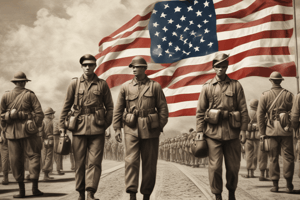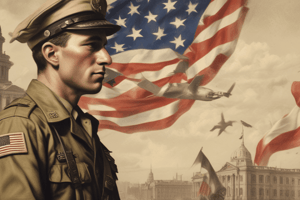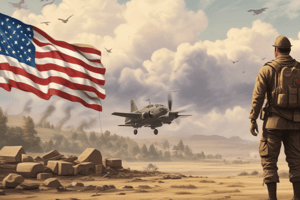Podcast
Questions and Answers
What did the Servicemen's Readjustment Act (GI Bill) provide for returning WW2 veterans?
What did the Servicemen's Readjustment Act (GI Bill) provide for returning WW2 veterans?
- College education
- Loans for houses
- Unemployment compensation
- All of the above (correct)
What is the goal of the Formation of the United Nations?
What is the goal of the Formation of the United Nations?
To promote international cooperation in law, security, development, progress, and human rights.
What does the term 'Iron Curtain' refer to?
What does the term 'Iron Curtain' refer to?
The metaphorical boundary dividing Europe into two separate areas post WW2.
What was the Employment Act of 1946 aimed at achieving?
What was the Employment Act of 1946 aimed at achieving?
What was the purpose of the Committee on Civil Rights?
What was the purpose of the Committee on Civil Rights?
What is Levittown known for?
What is Levittown known for?
What major provisions did the Taft-Hartley Act include?
What major provisions did the Taft-Hartley Act include?
What did the National Security Act of 1947 establish?
What did the National Security Act of 1947 establish?
What was the Truman Doctrine?
What was the Truman Doctrine?
What did the Loyalty Review Board investigate?
What did the Loyalty Review Board investigate?
What were the implications of the McCarran Internal Security Act?
What were the implications of the McCarran Internal Security Act?
What was the significance of Dennis et al. v. United States?
What was the significance of Dennis et al. v. United States?
What did HUAC stand for?
What did HUAC stand for?
What was the Hiss Case about?
What was the Hiss Case about?
Flashcards are hidden until you start studying
Study Notes
Post-War Legislation and Organizations
- Servicemen's Readjustment Act (1944): Provided educational benefits, housing loans, and unemployment compensation for WW2 veterans. Stimulated post-war economy by promoting education and construction.
- Formation of the United Nations (1945): An international organization aimed at fostering global cooperation to prevent future wars. Big Five Powers were given veto authority in the Security Council.
- Employment Act of 1946: Committed the federal government to promote economic growth. Established the Council of Economic Advisors to assist with employment and purchasing power policies.
- Committee on Civil Rights (1946): Investigated civil rights conditions and proposed measures for protection. Marked Truman's first use of presidential power to confront racial discrimination.
Housing and Economic Changes
- Levittown: Used mass production to create affordable suburban housing, symbolizing post-war suburbanization and community diversity for lower-middle-class families.
Labor Relations
- Taft-Hartley Act (1947): Outlawed closed shops and secondary boycotts, allowed states to enact right-to-work laws, and empowered the president to impose cooling-off periods during strikes. It created significant conflict between business interests and unions.
- Loyalty Review Board (1947): Reviewed backgrounds of over 3 million federal employees, leading to resignations and firings amid fears of Communist influence.
National Security and Foreign Policy
- National Security Act (1947): Restructured military and intelligence services, creating the Department of Defense, National Security Council, and Central Intelligence Agency (CIA), and instituted a peacetime draft for men aged 18-26.
- Truman Doctrine (1947): Requested $400 million in aid for Turkey and Greece to combat Communist threats, marking a commitment to counter Soviet expansion.
Anti-Communist Measures
- McCarran Internal Security Act (1950): Made it illegal to advocate for a totalitarian government and imposed restrictions on the employment and travel of individuals connected to Communist organizations.
- Dennis et al. v. United States: Supreme Court upheld the Smith Act, which prohibited advocating government overthrow, reinforcing legal limits on Communist activities.
- HUAC (House Un-American Activities Committee): Investigated suspected Communist influences among government officials and industries, aiming to eliminate perceived threats to national security.
- Hiss Case (1948-1950): Involved allegations against Alger Hiss, a former State Department official, related to espionage and Communist associations, reflecting post-war fears of infiltration.
Studying That Suits You
Use AI to generate personalized quizzes and flashcards to suit your learning preferences.




